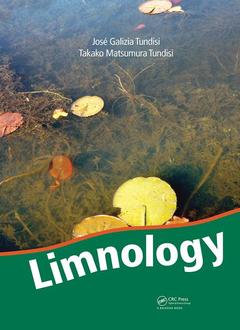Limnology
Auteurs : Tundisi Jose Galizia, Tundisi Takako Matsumura

Limnology provides an in-depth and current overview of the field of limnology. The result of a major tour de force by two renowned and experienced experts, this unique and richly illustrated reference presents a wealth of data on limnology history, water as a substrate, lakes? origins and aquatic biota. Besides a general part, it gives special focus to neotropical limnology, prevalently applicable in countries in the Southern Hemisphere.
Starting with the essentials, some definitions and a historical account, this volume then details the main interaction mechanisms with physical and chemical factors, diversity and geographical distribution. With regard to the major continental aquatic systems, it treats the dynamics, variability and characterization of lakes, reservoirs, flooded areas, saline lakes, estuaries and coastal lagoons. The impact of human activity on water resources and the need for the rehabilitation of watersheds, watershed ecosystems and estuaries are addressed subsequently. To illustrate theory, the final part includes research examples in limnology, ecology and environmental sciences in different geographical contexts, as well as ideas for new investigations.
This reference volume is intended for researchers and professionals working on inland waters, lakes and rivers within the fields of biology, ecology, environment, forestry, geochemistry, geophysics, and water management. It will also benefit students in the aforementioned areas and readers involved with limnology in related disciplines, such as earth sciences, environmental, water and geological engineering.
1. Limnology, definition and objective 2. Water as a medium 3. The origin of lakes 4. Physical processes and circulation in lakes 5. The chemical composition of water 6. Organisms and communities in inland aquatic ecosystems and estuaries 7. The dynamic ecology of aquatic plant populations and communities 8. The dynamic ecology of aquatic animal populations and communities 9. The flow of energy in aquatic ecosystems 10. Biogeochemical cycles 11. Lakes as ecosystems 12. Man-made reservoirs 13. Rivers 14. Estuaries and coastal lagoons 15. Wetlands, temporary waters and saline lakes 16. Regional limnology in Central and South America 17. Regional limnology in Africa and in temperate regions 18. Impacts on aquatic ecosystems 19. Planning and managing of water resources 20. Study approaches and methods: the present and future of limnology
Dr. Jose Galizia Tundisi obtained his PhD (Estuaries Ecology, 1969) at the University of São Paulo/University of Southampton and his DSc (Ecology, 1977) at the University of São Paulo. He is President of the International Institute of Ecology in São Carlos, Brazil. He was previously a Full Professor of Biological Sciences, Federal University of São Carlos, 1972-84; Full Professor of Environmental Sciences, University of São Paulo, 1984-94; and President, Brazilian of the National Research Council, 1995-99. His awards include the Gold Medal “Augusto Ruschi”, Brazilian Academy of Sciences, 1986; the Moinho Santista Prize in Ecology, 1992; the Highest Brazilian Award for scientific achievement; the Boutros Ghali Prize for Environment and Development, UN, 1995; and the Commendador, Brazilian Government. He is a Member of the Brazilian Academy of Sciences, the São Paulo Academy of Sciences, and the Ecology Institute, “Excellence in Biology”, in Germany. Dr. Tundisi is the founder and director of the International Institute of Ecology in Sao Paulo, Brazil.
Dr. Takako Matsumura Tundisi graduated in Natural History and received her Ph.D. in Biological Sciences (Zoology) from the University of São Paulo, Brazil. She was a lecturer and researcher in Aquatic Ecology at the Federal University of São Carlos for over two decades. Today, she is a director of the International Institute of Ecology (IIE) and of the International Association of Ecology and Environmental Management (IIEGA) in Brazil, both research and consulting organizations that have developed numerous research projects in water resources management and water quality through mathematical modeling.
Date de parution : 04-2017
17.4x24.6 cm
Date de parution : 01-2012
Ouvrage de 700 p.
17.4x24.6 cm
Thèmes de Limnology :
Mots-clés :
Matsumura Tundisi; drainage; Outfl Ow; basin; Rio Doce; uhe; Inland Aquatic Ecosystems; carlos; Aquatic Macrophytes; botelho; Limnological Studies; reservoir; Inland Aquatic Systems; aquatic; Dinofl Agellates; ecosystem; Benthic Macro-invertebrates; rio; Denitrifi Cation; doce; Benthic Macroinvertebrates; Fi Sh Fauna; Phytoplanktonic Succession; Sea Water; Underwater Radiation; De-stratifi Cation; Lake Chilwa; Humic Substances; Patos Lagoon; Artifi Cial Substrata; Eichhornia Crassipes; Shallow Lakes; Tropical Lakes; Aquatic Ecosystems; Saline Lakes



